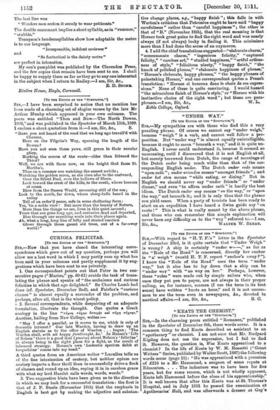CURIOSA FELICITAS.
[To THE EDITOR OF THE "SPECTATOR.") SIR,—Now that you have closed the interesting corre- spondence which grew out of my question, perhaps you will
allow me a last word in which I may partly sum up what has been said in your columns and partly supplement it by sug- gestions which have been sent to me privately.
1. One correspondent points out that Pater in two con- secutive pages ("Marius," pp. 60-61) avoids the task of trans- lating the phrase and speaks of " the archaisms and curious felicities in which that age delighted." So Charles Lamb had
done (cf. Spectator, December 2nd), and Fairfax's "curious chance" is almost equally a surrender of the problem, and
perhaps, after all, that is the wisest policy.
a 2. Several correspondents, while despairing of an adequate
translation, illustrate the thought. One quotes a Greek
analogy in the line " T‘XVI/ TtlX7P. gcrTE pte teal e6xa sixsas." Another, hailing from New College, writes :- " May I offer a parallel, as it seems to me, which is only of domestic interest ? Our late Warden, having to draw up an English statute as to the office of Warden . . . began : 'The Warden shall, with all happy forethought, &c: In Mahan's 'Life of Nelson' there is a good deal (passim) about Nelson's felicitas ' in always being in the right place for a fight, as the result of laboured strategy. Horace's own • Ludentis speciem dabit et torquebitur ' comes into my head."
A third quotes from an American writer " Lueullus tells us
of the fine intoxication of oratory, but neither opium nor oratory imparts a finer thrill than to successfully drive a flock of clauses and round up an idea, roping it in in careless grace with what my lord Hamlet calls words, words, words."
3. Two suggestive hints have been given as to the direction in which we may look for a successful translation : the first is that of J. P. Steele (November 18th) that the emphasis in English is best got by making the adjective and substan-
tive change places, e.g., "happy finish "; this falls in with Warton's criticism that Petronius ought to have said "happy carefulness " rather than " careful happiness "; the other is that of "B." (November 18th), that the real meaning is that Horace took great pains to find the right word and was nearly always (if not always) lucky in finding it. This minimizes more than I had done the sense of an oxymoron.
4. I add the chief translations suggested—"elaborate charm," "consummate charm," "ingenious felicity," "captured felicity," "careless art," "studied happiness," "artful artless- ness of style," "felicitous nicety," "happy finish," "the knack of polished phrase," " elaborate happiness of phrase," " Horace's elaborate, happy phrases," " the happy phrases of painstaking Horace," and one correspondent quotes a French translation : " Horace si heureux dans le choix de ses expres- sions." None of these is quite convincing. I would hazard "the miraculous finish of Horace's style," or "Horace with his instinctive choice of the right word" ; but these are para.-






































 Previous page
Previous page